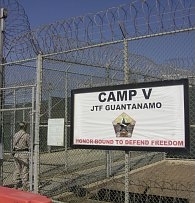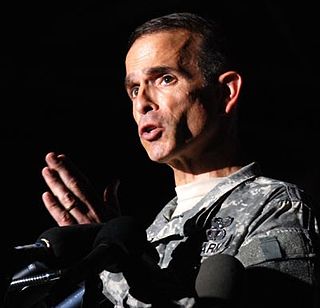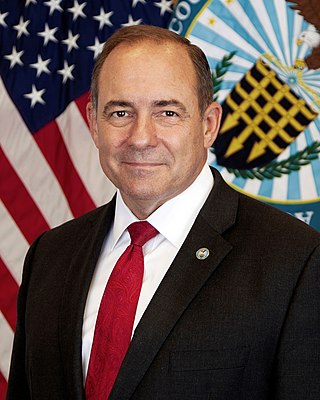
The United States National Security Council (NSC) is the principal forum used by the president of the United States for consideration of national security, military, and foreign policy matters. Based in the White House, it is part of the Executive Office of the President of the United States, and composed of senior national security advisors and Cabinet officials.

Counterterrorism, also known as anti-terrorism, relates to the practices, military tactics, techniques, and strategies that governments, law enforcement, businesses, and intelligence agencies use to combat or eliminate terrorism.

John Choon Yoo is a South Korean-born American legal scholar and former government official who serves as the Emanuel S. Heller Professor of Law at the University of California, Berkeley. Yoo became known for his legal opinions concerning executive power, warrantless wiretapping, and the Geneva Conventions while serving in the George W. Bush administration, during which he was the author of the controversial "Torture Memos" in the War on Terror.
Hamdan v. Rumsfeld, 548 U.S. 557 (2006), is a United States Supreme Court case in which the Court held that military commissions set up by the Bush administration to try detainees at Guantanamo Bay violated both the Uniform Code of Military Justice (UCMJ) and the Geneva Conventions ratified by the U.S.
The Australian Intelligence Community (AIC) and the National Intelligence Community (NIC) or National Security Community of the Australian Government are the collectives of statutory intelligence agencies, policy departments, and other government agencies concerned with protecting and advancing the national security and national interests of the Commonwealth of Australia. The intelligence and security agencies of the Australian Government have evolved since the Second World War and the Cold War and saw transformation and expansion during the Global War on Terrorism with military deployments in Afghanistan, Iraq and against ISIS in Syria. Key international and national security issues for the Australian Intelligence Community include terrorism and violent extremism, cybersecurity, transnational crime, the rise of China, and Pacific regional security.

NSA warrantless surveillance — also commonly referred to as "warrantless-wiretapping" or "-wiretaps" — was the surveillance of persons within the United States, including U.S. citizens, during the collection of notionally foreign intelligence by the National Security Agency (NSA) as part of the Terrorist Surveillance Program. In late 2001, the NSA was authorized to monitor, without obtaining a FISA warrant, phone calls, Internet activities, text messages and other forms of communication involving any party believed by the NSA to be outside the U.S., even if the other end of the communication lays within the U.S.

Morris Durham "Moe" Davis is an American retired U.S. Air Force colonel, attorney, educator, politician, and former administrative law judge.

The Guantanamo Bay detention camp is a United States military prison within the Guantanamo Bay Naval Base, also referred to as Gitmo, on the coast of Guantánamo Bay in Cuba. As of April 2023, of the 779 people detained there since January 2002 when the military prison first opened after the September 11 attacks, 740 had been transferred elsewhere, 30 remained there, and nine had died while in custody.
Ahmed Mohammed Ahmed Haza al-Darbi is a citizen of Saudi Arabia who was held in the United States Guantanamo Bay detainment camps, in Cuba from August 2002 to May 2018; in May 2018, he was transferred to Saudi Arabia's custody. He was the only detainee held at Guantanamo released during President Donald Trump's administration.
In United States law, habeas corpus is a recourse challenging the reasons or conditions of a person's detention under color of law. The Guantanamo Bay detention camp is a United States military prison located within Guantanamo Bay Naval Base. A persistent standard of indefinite detention without trial and incidents of torture led the operations of the Guantanamo Bay detention camp to be challenged internationally as an affront to international human rights, and challenged domestically as a violation of the Due Process Clause of the Fifth and Fourteenth amendments of the United States Constitution, including the right of petition for habeas corpus. On 19 February 2002, Guantanamo detainees petitioned in federal court for a writ of habeas corpus to review the legality of their detention.
Kristine Huskey is an American lawyer. Huskey is notable because she volunteered to help defend Guantanamo detainees. Huskey is the author of "Standards and Procedures for Classifying "Enemy Combatants": Congress, What Have You Done?"

Attorney Lawrence J. Morris is the chief of staff and counselor to the president at The Catholic University of America and a retired United States Army colonel.

David Frakt is an American lawyer, law professor, and officer in the United States Air Force Reserve.

Karen Joy Greenberg is an American historian, professor, and author. She is Director of the Center on National Security at Fordham University School of Law.

Matthew Glen Olsen is an American attorney who has served as the Assistant Attorney General for the National Security Division since 2021. He is the former director of the National Counterterrorism Center.
Robert M. "Bobby" Chesney is an American lawyer and the Dean of the University of Texas School of Law. He is the Charles I. Francis Professor in Law and was the associate dean for academic affairs before becoming the dean. Chesney teaches courses relating to U.S. national security and constitutional law. He is also the director of the Strauss Center for International Security and Law. Chesney addresses issues involving national security and law, including matters relating to military detention, the use of force, terrorism-related prosecutions, the role of the courts in national security affairs and the relationship between military and intelligence community activities. He is a co-founder and contributor along with Benjamin Wittes and Jack Goldsmith to the Lawfare Blog. He also co-hosts The National Security Law Podcast with fellow Texas law professor Stephen Vladeck.
In United States military law, a convening authority is an individual with certain legal powers granted under either the Uniform Code of Military Justice or the Military Commissions Act of 2009.

William K. Lietzau is an American lawyer, former U.S. Marine Corps Judge Advocate, and former Director of the Defense Counterintelligence and Security Agency.

Lisa Oudens Monaco is an American attorney, former federal prosecutor and national security official who has served as the 39th and current United States Deputy Attorney General since April 21, 2021. She is a member of the Democratic Party.

Colonel Gary D. Brown is an American lawyer and former officer in the United States Air Force. He was the official U.S. observer to the drafting of the Tallinn Manual on the International Law Applicable to Cyber Warfare (2013) and is a member of the International Group of Experts that authored Tallinn Manual 2.0 (2017). Professor Brown also appeared as the legal expert in the documentary film Zero Days (2016).












